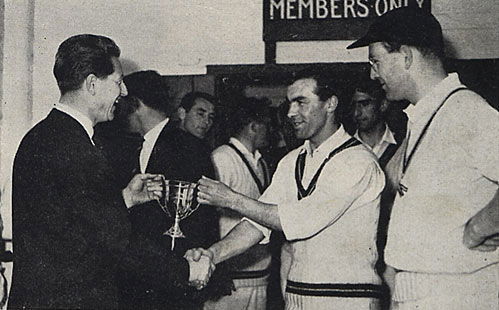
via Imago
The Midland cup of 1962. Mike Turner presents the trophy.

via Imago
The Midland cup of 1962. Mike Turner presents the trophy.

via Imago
Mike Turner presents Keith Andrew with the Midland Knock-Out Cup after Northants’ victory (Photo credits:ESPN Cricinfo)
The origin of the world’s greatest hides itself in a small idea, for all it takes is a revolutionary spark to influence generations. Ideas have influenced all of us too, from the way we think to the way we live some have so much so that they have re-fashioned the way this world operates. All it took was a little spark in the mind of a young Mark Turner, the then Leicestershire secretary to become a raging fire and change the way cricket was being played. It was exactly 54 years ago that cricket was revolutionised and from then on it never looked back in time.
Cricket has been in existence since 1725, and for that matter it grew over time and with popularisation the cricket with its matches running for days had spread it wings all over. But who had ever thought the format which was considered to be ultimate which defined cricket was to change for a rebel was born within. In the strictest terms, limited-overs cricket at first-class level began today exactly 54 years ago, on a cold May Day at Grace Road in Leicester.
ADVERTISEMENT
Article continues below this ad
The advisory body governing English cricket had discussed the idea of a limited-overs knockout tournament. The meeting was attended by several and Turner being one of them. The meeting saw the potential of such an event and agreed in principle to stage an experiment during the 1963 season.
ADVERTISEMENT
Article continues below this ad
Like any idea the key was to spot things early, just like a smart detective would. Turner spotted a gap in the fixtures during the season that might allow a dry run. The first two Wednesdays of the season showed four counties had the space to play in the experiment. The four counties were Leicestershire, Nottinghamshire, Derbyshire and Northamptonshire.
“I saw some gaps in the fixture list and phoned around,” Turner said. “My opposite numbers jumped at the chance. By the early 60s we had reached the end of cricket’s post-war boom. The crowds had declined and there was a need to make the game viable. These were parlous times and there were arguments about which direction the game should take.”
Turner’s entrepreneurial skills and convincing power aided in securing financial support and regional television coverage for the experimental contest, Turner conquered the challenges of finances and television coverage, however he couldn’t have controlled the climate. As fate had it the event wasn’t a huge success there was a frigid unseasonal cold making the weather altogether terrible. The climate affected two semi-finals along with a final in the following week, turned out to be low-scoring games. Leicestershire, the team bearing the source of the initiative, emerged as the winners of this Midlands event.
ADVERTISEMENT
Article continues below this ad
The idea did face criticism but may be this was the fresh breeze blowing and cricket had to move with time and for those who didn’t were left behind and cricket moved on with its new look. Come the following summer, roughly half a century ago on this very day the Gillette Cup was played and it turned out to be the progenitor of all the varying cricketing tournaments we see today. It was the first sponsored event of its kind. Unlike its predecessor the Midlands cup, this one turned out to be triumphant, the crowd turned out in large numbers, there were beautiful games of cricket that were played under pleasant circumstances and the final at Lords marked a full house finale to this enthralling season.
With this cricket only evolved from games lasting for specific number of hours of play to a set number of overs. It was here at the Gillette cup that unlimited time was available to get through 65- overs per side. And as we know it today cricket has become a hub of ideas, innovation and leagues and carries another young baby in its arms the T-20. Today One day cricket turns 54 and we hope to see this game we all love evolve and grow deeper on the grounds and within our hearts.
ADVERTISEMENT
ADVERTISEMENT
ADVERTISEMENT
ADVERTISEMENT

